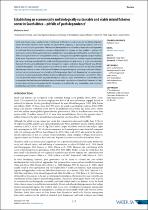| dc.contributor.author | Hara, Mafaniso | |
| dc.date.accessioned | 2022-07-26T09:46:08Z | |
| dc.date.available | 2022-07-26T09:46:08Z | |
| dc.date.issued | 2022 | |
| dc.identifier.citation | Hara, M. et al. (2022). Establishing an economically and biologically sustainable and viable inland fisheries sector in South Africa – pitfalls of path dependence. Water SA, 48(2), 217–226. https://doi.org/10.17159/wsa/2022.v48.i2.3923 | en_US |
| dc.identifier.issn | 0378-4738 | |
| dc.identifier.uri | http://dx.doi.org/10.17159/wsa/2022.v48.i2.3923 | |
| dc.identifier.uri | http://hdl.handle.net/10566/7630 | |
| dc.description.abstract | Small-scale fisheries play a significant role in livelihoods and food and nutrition security for millions of people
around the world. However, these benefits are under threat, especially in developing countries such as in
Africa, as a result of poor governance. The historical developmentalist and welfarist approach to management
of small-scale fisheries in developing countries, dating back from colonial era, has resulted in problems of
open-access regimes that usually lead to over-capitalisation, geographic spread of landing sites that makes it
difficult to organise fishers for management activities, inadequate management capacity and poor funding
of the sector. | en_US |
| dc.language.iso | en | en_US |
| dc.publisher | Water Research Commission | en_US |
| dc.subject | Hydrology | en_US |
| dc.subject | Biology | en_US |
| dc.subject | Small-scale fisheries | en_US |
| dc.subject | Poverty | en_US |
| dc.subject | Agrarian | en_US |
| dc.title | Establishing an economically and biologically sustainable and viable inland fisheries sector in South Africa – pitfalls of path dependence | en_US |
| dc.type | Article | en_US |

